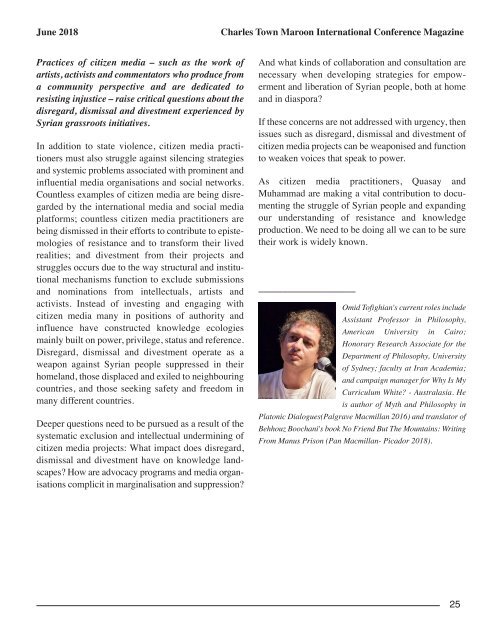Maroon Magazine 2018_266
Create successful ePaper yourself
Turn your PDF publications into a flip-book with our unique Google optimized e-Paper software.
June <strong>2018</strong><br />
Charles Town <strong>Maroon</strong> International Conference <strong>Magazine</strong><br />
Practices of citizen media – such as the work of<br />
artists, activists and commentators who produce from<br />
a community perspective and are dedicated to<br />
resisting injustice – raise critical questions about the<br />
disregard, dismissal and divestment experienced by<br />
Syrian grassroots initiatives.<br />
In addition to state violence, citizen media practitioners<br />
must also struggle against silencing strategies<br />
and systemic problems associated with prominent and<br />
influential media organisations and social networks.<br />
Countless examples of citizen media are being disregarded<br />
by the international media and social media<br />
platforms; countless citizen media practitioners are<br />
being dismissed in their efforts to contribute to epistemologies<br />
of resistance and to transform their lived<br />
realities; and divestment from their projects and<br />
struggles occurs due to the way structural and institutional<br />
mechanisms function to exclude submissions<br />
and nominations from intellectuals, artists and<br />
activists. Instead of investing and engaging with<br />
citizen media many in positions of authority and<br />
influence have constructed knowledge ecologies<br />
mainly built on power, privilege, status and reference.<br />
Disregard, dismissal and divestment operate as a<br />
weapon against Syrian people suppressed in their<br />
homeland, those displaced and exiled to neighbouring<br />
countries, and those seeking safety and freedom in<br />
many different countries.<br />
Deeper questions need to be pursued as a result of the<br />
systematic exclusion and intellectual undermining of<br />
citizen media projects: What impact does disregard,<br />
dismissal and divestment have on knowledge landscapes?<br />
How are advocacy programs and media organisations<br />
complicit in marginalisation and suppression?<br />
And what kinds of collaboration and consultation are<br />
necessary when developing strategies for empowerment<br />
and liberation of Syrian people, both at home<br />
and in diaspora?<br />
If these concerns are not addressed with urgency, then<br />
issues such as disregard, dismissal and divestment of<br />
citizen media projects can be weaponised and function<br />
to weaken voices that speak to power.<br />
As citizen media practitioners, Quasay and<br />
Muhammad are making a vital contribution to documenting<br />
the struggle of Syrian people and expanding<br />
our understanding of resistance and knowledge<br />
production. We need to be doing all we can to be sure<br />
their work is widely known.<br />
____________________<br />
Omid Tofighian's current roles include<br />
Assistant Professor in Philosophy,<br />
American University in Cairo;<br />
Honorary Research Associate for the<br />
Department of Philosophy, University<br />
of Sydney; faculty at Iran Academia;<br />
and campaign manager for Why Is My<br />
Curriculum White? - Australasia. He<br />
is author of Myth and Philosophy in<br />
Platonic Dialogues(Palgrave Macmillan 2016) and translator of<br />
Behhouz Boochani's book No Friend But The Mountains: Writing<br />
From Manus Prison (Pan Macmillan- Picador <strong>2018</strong>).<br />
25


